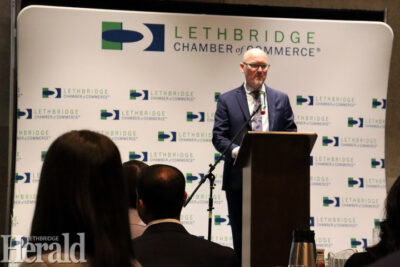Mayor covers priorities in State of the City address
By Lethbridge Herald on January 18, 2024.
 Mayor Blaine Hyggen gives his State of The City address at the Coast Hotel on Thursday. The event was sponsored by the Chamber of Commerce which hosted a breakfast for members and covered a variety of city priorities, projects and issues.
Herald photo by Al Beeber
Mayor Blaine Hyggen gives his State of The City address at the Coast Hotel on Thursday. The event was sponsored by the Chamber of Commerce which hosted a breakfast for members and covered a variety of city priorities, projects and issues.
Herald photo by Al BeeberAl Beeber – LETHBRIDGE HERALD – abeeber@lethbridgeherald.com
In front of a packed audience Thursday morning, mayor Blaine Hyggen presented his second State of the City address.
The event at the Coast Hotel was sponsored by the Lethbridge Chamber of Commerce.
His wide-ranging presentation focused on a number of topics during a talk that lasted slightly longer than an hour.
And while he talked, Hyggen clearly had the focus of the wall-to-wall crowd as they dined on sausage, eggs and potatoes.
From top priorities to project and event updates, Hyggen discussed every possible issue that matters to Lethbridge residents and the business community.
The mayor, who has often spoken about the need for transparency, openly talked about issues involving the Lethbridge & District Exhibition, water and wastewater infrastructure, community safety and the drug crisis, support for the vulnerable populations who live here, physician recruitment and retention, and of course, city finances.
Hyggen told the crowd that Lethbridge is a city of 106,550 residents, an increase of about 5,068 since the 2019 municipal census and is the third largest city in Alberta based on municipal census data.
“Lethbridge consistently demonstrates a sustainable rate of growth. The stability as well as steady growth and retention allows the City of Lethbridge to plan effectively for the future of our community,” the mayor said in opening remarks.
The city had challenges in 2023 which have continued in 2024 as well as “great news stories.”
Council is past the halfway part of its term and “it’s been a great honour and privilege” of all to serve the city, said Hyggen, who referred to his fellow members of governance as “a great council.”
Council is working with its local elected representatives including MLAs Shannon Phillips and Nathan Neudorf and MP Rachael Thomas to build a better Lethbridge and advocate for the resources and funding Lethbridge needs to address key issues, he said.
He said there is a push to further secure and advance the business sector’s needs so Lethbridge will be the first place investors and businesses come when they look to open new doors and ventures.
“But we still have a lot of work to do.”
The City, he said, is not the only municipalities facing challenges and it isn’t solely responsible in jurisdiction on some matters.
He addressed how the Exhibition management approached council last November to ask for $6.7 million in emergency funding and the immediate takeover of the pavilions, except the west one.
The Exhibition cited the impact of inflation, interest rates, supply chain issues and other lingering impacts from COVID-19 as causes of its financial shortfall. The Exhibition’s reserves have been depleted and it needed support from the City which gave it $25 million for the facility and a loan of $17.8 million loan. In December it approved interim resource funding of $250,000 allocated immediately and the City set aside up to $950,000 in contingencies.
The City is providing staffing resources “that will help maintain business continuity at the Agri-Food Hub,” said the mayor.
Currently two staff members are being used to provide interim transitional leadership until at least Jan. 23. A memorandum of understanding is to be developed by the City and Exhibition no later than Jan. 19 subject to council approval on Jan. 23. If the MOU is approved at that time, “it will provide further clarity and guidance for the next steps,” he said.
The Hub, he assured residents, remains open for business.
On the water and wastewater situation, he said water isn’t an infinite resource and as the city grows the process of providing services to residents and businesses becomes a more pressing issue.
He said he has provided a letter on behalf of council to the towns of Coaldale and Taber for two Alberta community partnership grant applications. They are seeking funding for analysis of potable water and wastewater infrastructure along the Highway 3 corridor, part of a shared desire to develop the corridor between Lethbridge and Medicine Hat as a global hub for agri-food processing facilities, he said.
The City is committed to regional collaboration on the pursuit of regional economic development.
He said the city’s municipal water and wastewater treatment systems require substantial capital upgrades, an expansion needed to meet the short- and long-term anticipated growth in regional and industrial demands.
The mayor assured residents there is no current danger to the water supply for Lethbridge residents, noting that the water level of the Oldman River dam dropped from 58 per cent in August to 26 per cent capacity in November.
On community safety, the mayor discussed the Statistics Canada Crime Severity Index tends to draw negative headlines when it’s released every year but it’s on the downward trend here as it is elsewhere.
Lethbridge was ranked No. 3 in the 2022 CSI Index and it has decreased. In 2022, the CSI was 118.97 compared to 129.48 in 2021, 138.65 in 2020 and 141.67 in 2019.
The data also used the CMA data which includes several nearby communities. Red Deer’s doesn’t have a CMA and without those communities included in Lethbridge’s CSI, that city’s rate was 30 points higher, he said.
“We know there’s a lot of challenges but most municipalities across North America are facing similar challenges,” he added.
“We most certainly have a beautiful and safe community in Lethbridge and I hope we can all remember that.”
The mayor gave a shoutout to city police service members “because it’s obviously not easy.” He pointed out the police commission directs the LPS, not city council.
He said the drug crisis experience here is a very complex issue with the City being one partner in the response as it supports the province and agencies to provide the programs and services related to addictions and mental health here.
He told the audience the City has undertaken 15 new initiatives to address the vulnerable population over the past year.
“We’re the first in Alberta to have a co-ordinated encampment strategy. . .we know that entrenched encampments do lead to crime,” said the mayor noting council conditionally approved more than $1.85 million in funding for two affordable and social housing projects which are conditional on the securement of at least that same amount in provincial or federal funding to match the municipal contribution.
Those projects would provide up to 80 new housing projects in Lethbridge.
“We’ve worked out a shelter development strategy,” said the mayor, citing the province’s recent $1 million contribution to fund up to 50 temporary winter shelter spaces here in a mobile unit at the Blood Tribe Department of Health operated shelter.
The province provides more than $3 million annually for the operation of 121 year-round shelter spaces, giving the city a total of 171 for those experiencing homelessness.
“Shelter capacity is an urgent issue for our community and we are grateful that we’ve been able to work with the Government of Alberta and Blood Tribe Department of Health to create the additional space.
On physician recruitment and retention, the mayor said in 2023, 43 physicians were recruited to Lethbridge. Of those 23 are family families and nine will soon be commencing practice here.
The city has three full-time OBGYNs now, which was a large concern, he said. This is up from one a year ago. Five others have signed contracts and will be commencing work this year and in 2025.
The City is heading to the University of Calgary and University of Alberta to recruit medical students to do rotations here and consider setting up practice when they complete training, the mayor added.
He reminded the audience that municipal government doesn’t have jurisdiction over healthcare in the province and this work hasn’t been typically done by council but it continues to support efforts to attract and retain medical professionals.
He talked about the City’s finances and how after three years of zero tax increases to minimize the impact of the pandemic, council had to raise those taxes in 2022.
“No one welcomes a tax increase,” he said.
But council had to create a budget that was needed to maintain service levels and address resident concerns, he said.
In August of 2021, council approved the streamlining of the capital and operating budget to achieve an aligned four-year cycle. Only budget items from 2022-25 have been previously approved within the 2022-31 CIP.
This will allow the four-year capital and operating budgets to be aligned in 2026 for the 2027-30 budget cycle, the mayor said. This is a change from the previous practice where council debates and approves a four-year budget cycle every two years, alternating between the CIP and operating budget. This change will help council achieve greater budget oversight and other things.
The mayor clarified a couple of points and misconceptions that might exist in the city.
Utility costs for water, sewer, garbage collection and recycling are among the lowest in Alberta while the commercial electricity rates are competitive with most other municipalities in the province, he said.
Municipal property tax capita is in the middle of the pack among Alberta communities, slightly higher than Calgary and Red Deer, slightly lower than St. Albert and Edmonton.
After last summer’s crashes on Whoop-Up Drive and Crowsnest Trail delayed commuting to west Lethbridge for several hours, the city revised its Whoop-Up Drive emergency protocols, he said.
“It’s OK for us to admit this was not handled in the best manner but we learned from it,” said the mayor, adding an incident debrief was held in July with all internal stakeholders.
The new protocol will provide two-way traffic on Whoop-Up in an event that the travel directions must be closed due to emergencies on the bridge deck or on the approach lanes.
It also calls for maximum one-way movement across Whoop-Up in the event of a mass evacuation on either side of the city, said Hyggen.
A multitude of other matters were touched upon in the talk which can be found on the City of Lethbridge’s YouTube channel.
Chamber president Cyndi Bester in closing said it’s important to challenge the status quo – that advocating changes in business practices involves addressing established norms, traditions or internal processes which can be uncomfortable to those resistant to change.
Internal resistance from organizations and stakeholders may arise if they perceive advocacy efforts as destructive or against their interests, Bester said.
58-57





Maybe for a period of time council didn’t raise the tax rate put they did raise the mill rate, which lead to increased funds for them to overspend with.